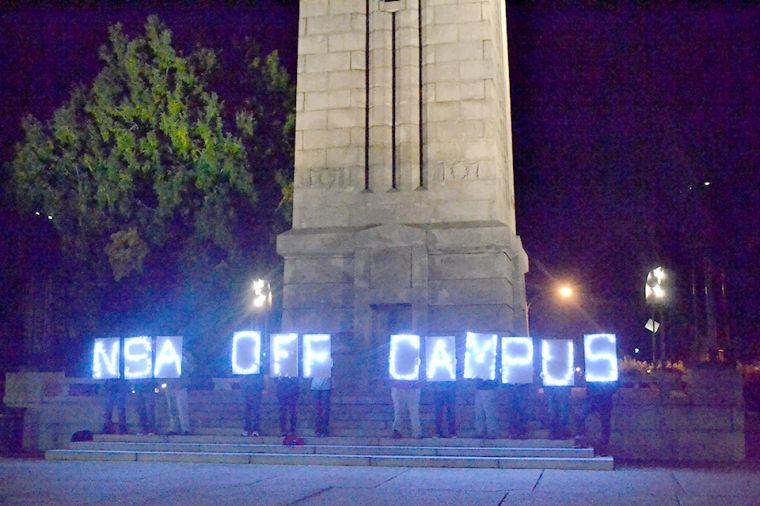A group of N.C. State students protested the University’s August announcement that the National Security Agency is open a research lab on Centennial Campus.
NCSU Students for Democratic Society led a Cryptoparty Monday to teach attendees about protecting themselves from governmental surveillance and show their frustration with recent revelations about the NSA’s data collection methods. The event culminated in an artistic demonstration at the Bell Tower.
Cryptoparty, a grassroots, global initiative introduces basic Internet techniques to the general public, teaching them how to encrypt their personal technologies from being read by surveillance.
More than 30 people attended the workshop and learned how to encrypt their web browsers, cellphones and hard drives from privacy invasion.
Cryptoparty started in 2012 on a Twitter thread between Australian privacy advocate @Asher_Wolf and computer security experts, according to Ryan Thomson, a graduate student in sociology. Since then, the event has become a global phenomenon to protest governmental surveillance.
After the workshop, attendees gathered at the Bell Tower to hold the first overpass light brigade in Raleigh, which read “NSA OFF CAMPUS” in protest of N.C. State’s August announcement of the NSA’s plan to build a new research lab on Centennial Campus
An overpass light brigade is a form of public artistic protest, originally created in 2011 when demonstrators sought to raise awareness about the campaign to recall Gov. Scott Walker of Wisconsin.
Thomson said the overpass light brigade was a creative way to promote public protest.
Thomson said he was let down when the University announced that the NSA had awarded N.C. State with a $60 million grant to build a research lab on Centennial Campus in August.
“Why would the NSA fund basic science research with no intention of doing any governmental surveillance?” Thomson said.
Thomson also said he had been disappointed with the secrecy surrounding the lab announcement. He said that even though many questions had been fielded toward Chancellor Randy Woodson and administration, the lack of university oversight gave the NSA free range to do as it wished.
Since the Edward Snowden controversy in May, the NSA has taken criticism from Democrats, Republicans and several major world leaders.
Steve Baker, a citizen of Raleigh, said that even though the NSA lab would bring jobs to the Triangle, he questioned the agency’s motives for coming to N.C. State.
Baker said one’s control of his or her own privacy is increasingly important.
“These events may start small, but as myself and other attendees spread the word, more and more people will learn about their privacy and begin to take it more seriously,” Baker said.
In August, Randy Avent, a professor of computer science, and principal investigator of the laboratory, told Technician that those worried that N.C. State will become a hub of surveillance operations could rest easy.
“It’s a research lab,” Avent said. “There are no operational problems being worked on at all. It’s a research lab conducting basic research concerning questions like ‘What are the fundamental techniques?’ and ‘What’s the fundamental math behind the problem?’”
Both Avent and Woodson then dismissed any notion that the University will evolve into a hub of surveillance for the NSA.
“I think it’s important to understand that we’re a public university,” Woodson said. “So we’re not in the business of operational intelligence, which is one part of what the National Security Agency does, but that’s not what N.C. State will be involved in or what will go on at Centennial Campus.”’








